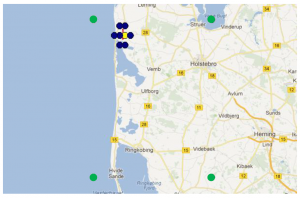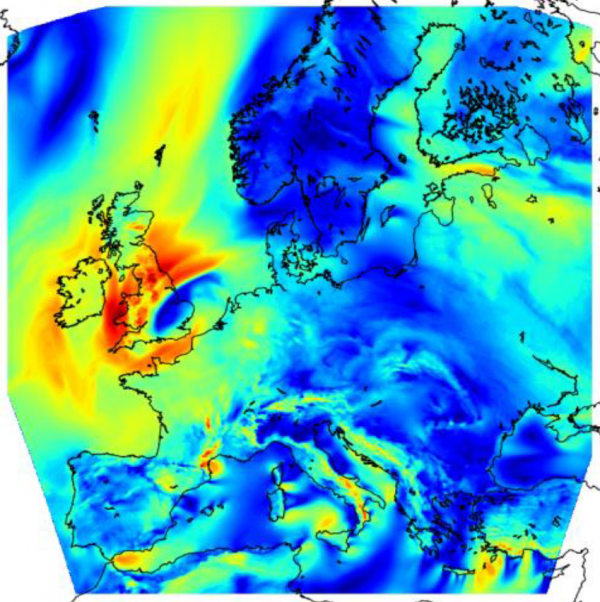EMD-ConWx Meso Data Europe

WindPRO 2.9 introduces a high-resolution meso-scale data set covering Europe. The data are modeled and computed in-house - in a collaboration between EMD and ConWx (http://www.conwx.com) who are experts in meso-scale modelling.
Note: This data-set requires an additional license (see below).
Dataset Description
The meso-scale model is run at a high spatial resolution of 0.03°x0.03°, approximately 3x3 km, with hourly temporal resolution. ERA Interim data from ECMWF (http://www.ecmwf.int) are the global boundary data. The timespan of the data is at least 15 years back from today, extended to cover a minimum of 20 years during 2013. Data access is via WindPRO’s user friendly interface to on-line data and payment of an annual subscription fee.
Release Schedule
Data are updated monthly with an approximate 3 months delay defined by ERA Interims availability and computational efforts at EMD's high-performance computer clusters.
Required modules/licenses
To access the EMD-ConWx meso-scale data the following licenses/modules are required in your WindPRO setup:
- Basis
- METEO
- MCP
- EMD-ConWx Meso Data, Europe
When the license fee is paid, then you have access to the full data-set without further cost. The cost is available from the price-list on the EMD-homepage. Downloading of data is unrestricted for licenced users, however a "fair use" policy applies. Unlicenced users may download three months of data from any point, however multiple downloads are not allowed from the same point.
Model Domain
The model domain for the EMD-ConWx model is shown in the figure below. Our new data set covers Europe including larger parts of Turkey and Ukraine, excluding the northern extremes of Scandinavia.

Dataset Parameters
A large quantity of useful parameters are available directly in WindPRO to aid your analysis. The different parameters in the EMD-ConWx dataset that are available from within WindPRO are shown in the table below.
| Parameter | Description |
|---|---|
| time | UTC time stamp |
| psfc | Pressure at site [hPa] |
| msl | Pressure at mean sea level [hPa] |
| wSpeed.x | Wind speeds at different physical levels (x). Heights (x): 10m, 25m, 50m, 75m, 100m, 150m, 200m |
| wDir.x | Wind speeds at different physical levels (x). Heights (x): 10m, 25m, 50m, 75m, 100m, 150m, 200m |
| wSpeed.0-30mb | Wind speeds at pressure level 0-30mb. |
| wDir.0-30mb | Wind speeds at pressure levels 0-30mb. |
| wSpeed.850hpa | Wind speeds at pressure level 850hPa. |
| wDir.850hpa | Wind speeds at pressure levels 850hPa. |
| temperature.x | Temperatures at different heights (x) Heights (x): 2m and 100m |
| waterTemp | Water temperature |
| soilTemp.0-10cm | The temperature in the upper 10 cm of the soil |
| relHumidity.2 | Relative humidity in height 2m above ground level |
| snowDepth | Show depth (if present) |
| vis.s | Visibility at surface |
| sensHeatFlux.s | Sensible Heat Flux at surface |
| totPrecip.s | Total Precipitation at surface |
| downShortWaveFlux.s | Downward shortwave heat flux at surface |
| totalCloudCover.a | Total cloud cover in atmosphere |
| convCloudCover.a | Convective cloud cover in atmosphere |
| 4LFTX | N/A |
| rmol | N/A |
| znt | Rougnhess length |
| sqrtTKE.x *) | Turbulence (given as standard deviation in m/s). Derived from the turbulent kinetic energy (TKE). Results available in different physical levels. Heights (x): 10m, 25m, 50m, 75m, 100m, 150m, 200m |
| cloudWater.100 | Parameter intended for estimating probability of icing. |
| cloudIce.100 | Parameter intended for estimating probability of icing. |
_*) Selected years only
Model Experiences
The model-setup has been validated through various internal investigations on masts around Europe. Direct comparison against a tall Danish mast at Høvsøre is found on the second page of the EMD-ConWx Meso datasheet available.
EMD and some users has found that the absolute levels of the wind speeds may be 10%-15% off at some Central European locations. However, note, that this data-set was not designed to replace a mast but rather intended for long-term corrections of local masts. For this purpose we have excellent experience with the use of the data – the absolute level does not need to be correct, as long as it is consistent.
For the absolute levels to be (more) correct and potentially useful for direct micro-siting analysis, the need to incorporate a down-scaling procedure and further utilization of a micro-scale model with associated micro-scale topography is currently being investigated (2013).